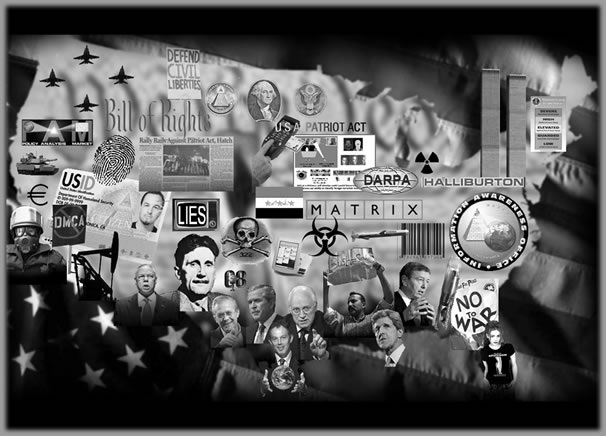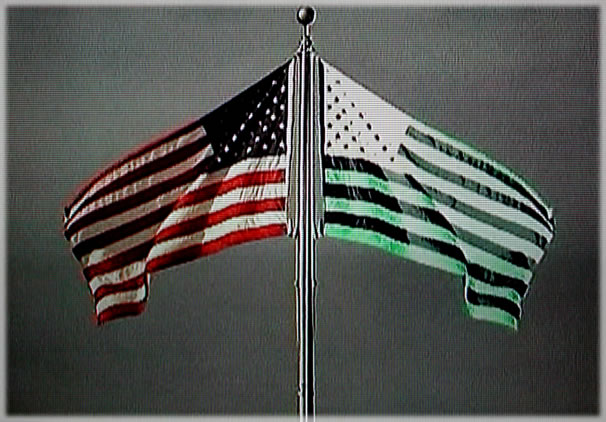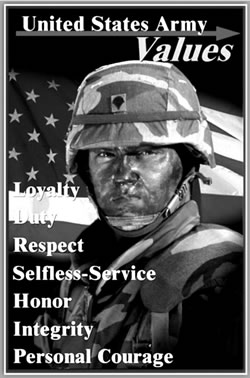 Image courtesy of The Post September 11th Timeline website Image courtesy of The Post September 11th Timeline websiteBy Maria Cavit WATCHING CURRENT global affairs, one can't help but note the US movement underway to 'spread democracy' throughout the world. Most of us were taught that a democratic government is a just, free and fair government, or, as Lincoln put it standing on the Gettysburg battlefield, a government "of the people, by the people, and for the people." But if the state of the world shows us anything at all in this hour of humanity, it's perhaps to question whether 'democracy' can still be considered synonymous with these values. The term "democracy" is a direct interpretation of the Greek Athenian "dhmocratia" carrying the literal translation "people power." Reflect a little, and no doubt you'll struggle to find the "people power" in today's comprehension of the word. In fact, there is a growing view that the current preoccupation with promoting democracy is really about sustaining a system of elitism "under a consensual form of authoritarianism, otherwise known as 'polyarchy'." (1) Said another way, "The 'democratic consensus' in the new world order is a consensus among an increasingly cohesive global elite on the type of political system most propitious to the reproduction of social order in the new global environment." (2) Is that what's really happening? Let's leave behind the complexity of definitions, and ask ourselves a simple question: Who actually gave the United States this 'duty' to spread democracy in the world? Was it you or me or any people like us? Where did the idea originate? Is the US the "supreme" democracy, or is this an academic notion, the influence of media, a result of the current economic marketplace, our governments furthering an agenda? In searching for that answer, one can recall the words of William Blum, author of Rogue State: "Propaganda is to a democracy what violence is to a dictatorship."(3) Surely we the people haven't again fallen prey to political propagandists? But if not, how was it determined that the US would be the 21st century "bully on the block"? (Colin Powell's words, not mine by the way). And if the current accusations are true, can a political ideology supported by a rich and powerful few truly succeed in changing the dynamics of our planet? Let's take a look at some recent history that may shed light on the current geopolitical usage of the word democracy. American Geopolitical Strategy: 1990 and Beyond
In the 1990 Gulf War, the US decided to use overwhelming force to quickly defeat enemies. By the start of the 1990s and with the ending of the Cold War, the US took further steps in this direction and acted to prevent the re-emergence of any new rival. The Base Force Plan was prepared with the objective of ensuring sufficient US power to "deter any challenger from ever dreaming of challenging us on the world stage." (4) By the spring of 1992, Paul Wolfowitz and I. Lewis Libby (two political appointees in the Pentagon's policy office at the time, under the leadership of then Pentagon chief Dick Cheney) drafted a Defence Planning Guide which clearly detailed three important objectives: to prevent the re-emergence of a new rival; to prevent any hostile power from dominating a region of strategic significance to the US; and to convince allies and enemies alike "that they need not aspire to a greater role or pursue a more aggressive posture to protect their legitimate interests." (5) The agenda for the consolidation of US power and the pursuit of a strategy of unilateralism and global dominance was clear to readers of the draft. It wasn't difficult to understand language such as: "Our number one mission in the world, now that we are the sole superpower, is to make sure we stay that way… we will retain the pre-eminent responsibility for addressing selectively those wrongs which threaten not only our interests, but those of our allies or friends." Among the interests the United States would defend were"…access to vital raw materials, primarily Persian Gulf oil, proliferation of weapons of mass destruction and ballistic missiles, [and] threats to U.S. citizens from terrorism." After the ensuing national and international outcry, other drafts were prepared until the Defense Strategy for the 1990s was released in 1993 just before Cheney left office. (6) It was to stress that the American "preference" was to act "in the lead role" collectively where possible and "independently if necessary," thus requiring the US to maintain massive military superiority. It was a more polite, politically-correct reading but the intent was much the same as that defined in the original draft. In any case, the Clinton administration took the presidency in 1993 (which administration did not, to all intents and purposes, pursue the heavy-handed unilateral approach of Powell, Cheney and Wolfowitz) and these plans appeared to grind to a halt for the next eight years. Or did they? PNAC And The Neocons
In 1997 the Project for the New American Century (PNAC) emerged. PNAC is a US-based "think tank" with the stated aim of promoteing "American global leadership." PNAC members have a commitment to these guiding principles: that American leadership is good both for America and for the world; that such leadership requires "military strength, diplomatic energy and commitment to moral principle"; and that any US political leader must make the case for global leadership. The PNAC advocates "a policy of military strength and moral clarity" to include significant increases in US defence spending; strengthening of ties with allies and the challenging of regimes hostile to US interests and values; promoting the cause of political and economic freedom outside the US; preserving and extending an "international order friendly to US security, prosperity, and principles"; and control of the 'international commons' of space and cyber-space. (7) One can imagine that a US think tank would wish to promote US leadership and interests -- however this situation is a little more complex. The PNAC is actually a very powerful lobbying group with the majority of its members being influential US/global decision-makers. Several PNAC members have held, and most still hold, high positions within the Bush Administration: Richard Perle, until recently Lewis Libby, John Bolton, Richard Armitage, Dick Cheney, Peter Rodman, Elliot Abrams, Donald Rumsfeld and Zalmay Khalilzad -- to name just a few. Their positions continue to be well supported by other high profile US officials such as Paul Wolfowitz, Douglas Feith and Karl Rove. PNAC membership also includes high profile journalists and global media owners, as well as many elite of the academic and business communities. Remember the definition of polyarchy? I didn't think so. Here it is again: Polyarchy is authoritarian government with democratic consensus. The core political ideology shared by PNAC members is neo-conservatism. Irving Kristol (PNAC Chairman and unofficial spokesperson for neoconservatism) has this to say about the neoconservative philosophy: "…cutting tax rates in order to stimulate steady economic growth… [they] do not like the concentration of services in the welfare state and are happy to study alternative ways of delivering these services… [are] united on issues concerning the quality of education, the relations of church and state, the regulation of pornography, and the like, all of which they regard as proper candidates for the government's attention. [There is] no set of neoconservative beliefs concerning foreign policy, only a set of attitudes [including]: patriotism is a natural and healthy sentiment and should be encouraged by both private and public institutions. World government is a terrible idea since it can lead to world tyranny. International institutions that point to an ultimate world government should be regarded with the deepest suspicion… statesmen should, above all, have the ability to distinguish friends from enemies…'national interest' is not a geographical term." (8) That's well and good, straight from the horse's mouth and all, but who are these neoconservatives really? The Neoconservative Movement
Neoconservative ideology can be traced back to conservative political philosopher Leo Strauss, PNAC co-founder Donald Kagan, and former Trotskyist-communist turned nuclear strategist Albert Wohlstetter. Retired editor of the influential monthly publication Commentary Norman Podhoretz claims neoconservatism also came out of the teachings of Edmund Burke and Adam Smith. In 2004, he explained in an interview that neoconservatism shows how "love is not the answer to hate" and his belief that idealists create more "problems" than those that exist by "following the route of self interest." Podhoretz therefore insists that the PNAC "pursues a policy of moral clarity". (9) Can there be moral clarity without some idealism? And who is charged with determining this moral clarity when the promotion of self-interest is at stake? Earlier we spoke of using propaganda as a means to an end. As journalist John Pilger notes after years of researching the PNAC and its members, "The thread running through their ruminations is the importance of the media: 'the prioritised task of bringing on board journalists of repute to accept our position.'" (10) Is this an example of moral clarity? According to the Christian Science Monitor, the original neoconservatives (neocons) were "a small group of mostly Jewish liberal intellectuals who, in the 1960s and 70s, grew disenchanted with what they saw as the American left's social excesses and reluctance to spend adequately on defense… By the 1980s, most neocons had become Republicans, finding in President Ronald Reagan an avenue for their aggressive approach of confronting the Soviet Union with bold rhetoric and steep hikes in military spending. After the Soviet Union's fall, neocons decried what they saw as American complacency and in the 1990s warned of the dangers of reducing American defence spending and role in the world." (11) Neoconservative ideology supports military spending, rejects permanent systems of alliance, deters where possible US participation in global treaties, and avoids relationships with national or international bodies (such as the United Nations) that might exert influence over US military actions. It is in this spirit that the Bush administration has sought to increase support for missile defence and space-based weaponry, abandoned the Anti-Ballistic Missile Treaty with Russia, opposed an international nuclear test ban pact, refused to support the International Criminal Court, and hardened relations with China and North Korea -- amongst others. Walter Russell Mead (senior fellow at the US Council on Foreign Relations) explains further: "When we think of Wilsonianism now, we tend to think of secular, humanist ideas -- building a world government -- sort of a Europeanist foreign policy. If you went back a hundred years or so, Wilsonianism was carried out by people like missionaries who thought that the way to make America safe was to make the rest of the world believe the way we do and act the way we do. But they weren't as concerned about the institutional aspect. The neocons of today have sort of revived this older Wilsonian tradition. They are no longer concerned, say, about the United Nations, which is what we think Wilsonians are mostly thinking about... or the World Court. In fact, they think that stuff gets in the way to some degree. But they are more concerned about basic American values and spreading those. So it's a different Wilsonianism from what we've all grown up thinking about. It's non-institutional and it's values-based. To some degree, it's a conservative Christian value base. Even though many conservatives are Jews, the sort of basic values that they are promoting are very much the sort of Protestant, Christian values that were dominant in 19th-century America." (12) The Bush II Years: PNAC ImplementedIn returning to our earlier outline of the timetable in the implementation process of the former Defence Planning Guide (DPG), things become much clearer after 11 September 2001. "The process of transformation, even if it brings revolutionary change, is likely to be a long one, absent some catastrophic and catalyzing event -- like a new Pearl Harbor." Hence, the original draft of the DPG was brought to life in slightly modified form as the answer to terrorism -- they had their Pearl Harbour to act on. It was then that Wolfowitz and Libby would call for unilateral military action against Iraq, claiming Al Qaeda must have had the assistance of Saddam Hussein. Following that, Bush's January 2002 State of the Union address labelled Iraq, Iran, and North Korea as an "axis of evil." He could then make the call for pre-emptive action, insisting the US would prevent the emergence of any rival power by maintaining "military strengths beyond the challenge." We're hearing a lot of calls to undertake "preemptive action" nowadays, don't you find? The PNAC has successfully advocated and lobbied for key economic and foreign policy positions since 1997. (13) The US invasion of Iraq saw the PNAC position as outlined in its 2000 report "Rebuilding America's Defences: Strategies, Forces And Resources For A New Century" fall into place: "Indeed, the United States has for decades sought to play a more permanent role in Gulf regional security. While the unresolved conflict with Iraq provides the immediate justification, the need for a substantial American force presence in the Gulf transcends the issue of the regime of Saddam Hussein." (14) These PNAC successes have been succinctly summarised by Truthout.org: "In 2000, they [PNAC] put out a report asking to fight several major theater wars. Under Bush, they got their wish. In 2000, they asked for at least 3.8 percent of GDP to go to the Defense Department. Under Bush, they got it. In 2000, they asked for a war in Iraq. Under Bush, they got it, and be damned to the truth. In 2000, they asked for the ability to turn America into a nation that attacked first and asked questions never. Under Bush, and his 'National Security Strategy' of 2002, they got it." (15) Scary stuff isn't it, and what of the future -- what other PNAC ideas and plans are waiting to be implemented? In a Christian Science Monitor interview about future neocon strategy, the question was asked: What's next for the 'axis of evil'? How do neocon strategists intend to confront North Korea and Iran? What about China? In response, Max Boot (US military historian and neocon) suggested that North Korea and Iran were "the two biggest threats to the United States at the moment because of their nuclear weapons programs and tyrannical governments." He recommended pre-emptive policy "seeking to democratize those countries so that they no longer seek to threaten their neighbours or the US." (16) Quoting Richard Perle in a Frontline interview: "There is a core of liberal democracies, Western industrial nations, by and large, who share common values and common interests, who are collectively threatened by the North Koreas, by the Iraqs, by the Libyas, and the Syrias, and the rest and they ought to band together to protect their common interests, which happen to reflect the best interests of mankind." (17) Democracy and American Imperialism: Must This Be?Further 'democratisation' by the US military might be on the card it seems. Which leads us back to the original query -- what exactly does that mean to 'the people' in those countries, and the people in the so-called free world? Do you support the neocon idea of a globalised free market economic system within the political framework of US unilateralism? Do you agree with US hegemony and the idea that if it's good for America it's good for the world? Who do you view as 'the people' within a country, within a democracy? Who do you think are 'the people' currently being heard? Finally, can a political ideology supported by a rich and powerful few truly succeed in changing the dynamics of our planet? Based on what we're seeing around the globe, it would seem so. All in the name of democracy!  Flag and Its Shadow, 2004 looped video projection, by Van McElwee, Courtesy of University of Chicago News Office
(1) Stuart Copeland, Chairman (PPI Forum Member), Birmingham, UK "Why
Democracy (people power) is bound to fail in Iraq, as it has done in the
developing world,"
(2) W. Robinson, Globalisation: Nine theses on our epoch, Race and Class, Vol. 38 No. 2, 1996, p.17 (3) W. Blum, Rogue State: A Guide to the World's Only Superpower Common Courage Press, 2000 (4) The Base Force Plan (5) Information on the original draft of the Defense Planning Guide http://www.yale.edu/strattech/92dpg.html http://www.crisispapers.org/Editorials/PNAC-Primer.htm 6) The 1993 Regional Defense Strategy; (7) As detailed on the official PNAC website (8) The Neoconservative Persuasion, Aug. 25, 2003 issue "What it was, and what it is" by Irving Kristol, 08/25/2003, Volume 008, Issue 47 (9) Norman Podhoretz interview (10) John Pilger article, Why Bush lies about Iraq (11) Christian Science Monitor overview of the origins of neo-conservatism (Neocon 101) (12) Walter Russel Mead interview (13) The complete list of PNAC letters and signatories (14) PNAC Report: Rebuilding America's Defenses, pg. 14. (15) Truthout.org (16) The Christian Science Monitor interview (17) The Frontline interview Some further information and reading: http://www.monthlyreview.org/1203duboff.htm http://www.thenation.com/doc/20040223/lind http://www.oilempire.us/media.html http://www.informationclearinghouse.info/article1544.htm http://www.pnac.info/blog/archives/000012.html http://www.sundayherald.com/27735 http://sfgate.com/cgi-bin/article.cgi?f=/c/a/2005/10/28/MNGMPFESCJ24.DTL http://www.theindyvoice.com/index.blog?entry_id=417960 http://www.frontpagemag.com/Articles/Printable.asp?ID=7550 http://www.tompaine.com/articles/why_wolfowitz.php |
Planet Waves Homepage | Subscribe
For customer service, please call (877) 453-8265, or + (206) 567-4455.
